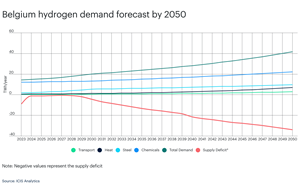News
Belgium passes new H2 transmission law
Belgium passed a new law on H2 transmission, which introduces a regulatory framework for the transportation of H2 through pipelines into the Belgian H2 market. One of the main stipulations is the establishment of the conditions for the designation of a H2 Network Operator (HNO) for Belgium.
The HNO will be designated over a period of 6 months–7 months from the law entering into force. The HNO will operate for a period of 20 yr, which may be prolonged at the request of the HNO, 5 yr before its termination date.
Other existing networks may obtain the status of independent operators. Operators can also maintain ownership of their networks and request the HNO to manage the network on their behalf. The methodology for transferring ownership to the HNO from network operators is yet to be developed.
The Belgian Federal Commission for Electricity and Gas Regulation (CREG), the General Directorate of Energy, the Council of Ministers and the Belgian Minister of Energy will be part of the designation process.
The HNO’s responsibilities include:
- Facilitating free and non-discriminatory access to the H2 transport network.
- The publication of a Network Development Plan (NDP) every 2 yr, with a 10-yr outlook on the market. The NDP is monitored by CREG and approved by the energy ministry. The NDP will include a 4-yr binding investment program.
- The HNO will guarantee H2 quality standards across the network.
- CREG will act as the regulator of the HNO, operating in the same way as a gas or electricity regulator. Its responsibilities will include establishing a revenue framework and approving tariffs proposed by HNO.
The current law affects all H2 transport via pipelines in Belgium and to neighboring countries. The law does not apply to supply networks, according to the text published in the Belgian Monitor.
This comes after the Belgian Council of Ministers previously approved a subsidy of €250 MM for the H2 transport network, including for an interconnection with Germany and system connections between different Belgian clusters, including Ghent, Antwerp, Mons, Charleroi and Liege.
The funding will be awarded to the HNO after its appointment in line with the newly published law. ICIS Analytics forecasts estimate that H2 demand in Belgium will reach 41.5TWh/yr by 2050, with a demand shortfall of 34TWh/yr by the same time. The shortfall will need to be covered through imports.
The adoption of a legal framework for the transport of H2 by pipeline is part of the country’s H2 strategy. Public consultations were launched in January 2022. By 2025, the Belgian strategy aims to develop a H2 market hub linked to physical supply hubs in Belgium.
By 2026, 100 km–160 km of new or repurposed H2 pipelines are to be in place. Finally, by 2028, the Belgian strategy targets the establishment of a transport network with Germany, France and the Netherlands.


